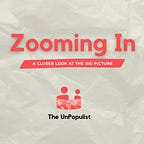Listen to Zooming In at The UnPopulist in your favorite podcast app: Apple Podcasts | Spotify | Google Podcasts | RSS
Aaron Ross Powell: Welcome to Zooming In, a project of The UnPopulist. I’m Aaron Ross Powell. Today we have our editors’ round table where I’m joined by Shikha Dalmia and Akiva Malamet to discuss the Supreme Court’s recent Students for Fair Admissions v. Harvard decision, which invalidated university affirmative action programs.
A transcript of today’s podcast appears below. It has been edited for flow and clarity.
Aaron Ross Powell: Shikha, do you want to start us off by maybe talking a little about the legal history that got us to this point?
Shikha Dalmia: Sure, Aaron, and as usual, thanks for doing this. This is a hot subject right now, so I’m glad we’re weighing in.
Just to put my cards on the table, I have exceedingly mixed feelings about this ruling. On one hand, I think the outcome, which is essentially outlawing affirmative action, or some kind of racial preferences for minorities, is going to make the system more unfair than it’s currently been—not more fair, as a lot of the boosters of this ruling are suggesting.
On the other hand, the whole admissions process is a complete mess, it’s a complete racket, in fact, and this case highlighted that. Our admissions standards and admissions practices have developed in response to the legal jurisprudence that has evolved on the subject since 1978 when the Supreme Court issued its Bakke ruling.
In the Bakke case, which is a famous case, Justice Powell at that time said that universities can use race as one factor, as a plus factor, but not as a decisive consideration in order to admit a minority student. In other words, there was a widespread understanding then that a purely merit-based standard with no accommodation for anything else would lead to [un]fair results.
But the Constitution bans outright racial preferences on the basis of your skin color. That is a constitutional no-no, the 14th Amendment bans it, the Civil Rights Act bans preferences due to race. Obviously, the 14th Amendment and the Civil Rights Act were meant to prevent privileged white students from profiting by preferences. The standard was that no skin color ought to be used. But Bakke allowed a little accommodation.
Fast forward about 20 years, and then you get to University of Michigan, Aaron, which you attended, and I was in Michigan when the University of Michigan's famous cases, Gratz vs [Bollinger] and Grutter. Two female white students challenged the university because they felt that the race-based standard that the university was using was discriminating against them. These two were really famous cases.
At that point, the University developed a pretty interesting rationale for defending race-based preferences. It developed what was called the diversity defense, which meant that racial preferences became no longer about actually just remedying past racial discrimination, they became about improving the educational experience of all students, including white students. The idea was that if you have more minority students and Blacks and Hispanics with diverse backgrounds of disadvantage, it actually opens up richer conversations and makes white students aware of certain things that they may not be aware of and vice versa.
The reason this rationale was developed was because this is the only one that could overcome the constitutional barriers to using race-based preferences. There is a separate standard which says that governments—and I should remind listeners that University of Michigan was a public university— government entities can use racial considerations when they have a “compelling state interest,” and they meet strict scrutiny—meaning that the racial considerations are central to the mission of what the entity is trying to accomplish, and there is no other way to accomplish that mission.
The University of Michigan developed this diversity standard, which turned out to be a really bad standard. I'm not saying there's nothing to it. I think there's actually benefit in having diverse students in a student body. I don't disagree with that, but as a way to get around the 14th Amendment and the Civil Rights Act, it just led the university to embrace entirely arbitrary admission standards where if you were Black or Hispanic, the university was boosting your GPA from three points to four points. Whereas, if you were an Asian student, because they were overrepresented, there was a penalty to your application.
The diversity standard has led to such confusion and so much arbitrariness. It led to the Harvard case and the University of North Carolina case, the two universities that were challenged in the current ruling. Basically, the argument was not so much that these standards discriminate against whites, although they do, but that they discriminate against Asians. They were pitting one racial group against the other, and there was no doubt about it that Asian students were really, really losing out in all of this.
The big thing that this ruling—the reason I said this ruling is going to make matters worse rather than better from the standpoint of fairness and equity, is that there are so many other kinds of preferences that the universities use, private and public universities, but because they are not constitutionally offensive, the universities can continue to use them. These preferences apply to athletes, they apply to legacies, they apply to children of faculty. These preferences take so many seats out of a purely meritocratic pool that it increases the unfairness for everybody else.
“There are so many other kinds of preferences that the universities use, private and public universities, but because they are not constitutionally offensive, the universities can continue to use them. These preferences apply to athletes, they apply to legacies, they apply to children of faculty. These preferences take so many seats out of a purely meritocratic pool that it increases the unfairness for everybody else.” — Shikha Dalmia
Now, keeping these preferences (legacy, athletics) but removing racial preferences essentially means that minority seats are available for competition by majority communities—whites—but majority seats which, went to these various racial preferences, are still no longer available to minorities. The racial preferences for whites are going to effectively increase and minorities are going to be left out even more from some of our elite institutions.
Powell: Yes, I think that does a good job of summarizing some of my complicated thoughts about this as well, because I guess I want to set aside the rightness or wrongness of the court's particular legal reasoning. Because I think that as is the case with most constitutional law, smart people can very much disagree. I have over years in law school and then years of being involved in the public policy space have increasingly come to view, essentially, most constitutional law arguments as cover for underlying ideological and policy preferences that you can reason your way to whatever position you want and make it plausible on the constitutional and legal grounds.
That said, yes, what's been fascinating to me to watch and often troubling is how much the focus is on getting rid of racial discrimination. I think that that claim that Roberts had made in prior decision, a prior affirmative action decision that if you want to stop discrimination on the basis of race, you need to stop discriminating on the basis of race and affirmative action was simply that, is a really common view that has a surface level plausibility to it.
We don't want the government to treat people differently because of the color of their skin and we don't like it when private actors treat people differently because of immutable characteristics. The uproar about the other big decision on the wedding for a gay couple speaks to that. We don't want, in this case, a web designer to be able to turn away a gay couple for their identity. There's a real case for being upset about that kind of discrimination.
That makes a lot of sense, but it also seems to tie into this real desire to basically say, "The only kind of racial discrimination that still exists is government-based racial discrimination." If we can just get the state to stop discrimination against people, racial discrimination goes away. It's a denial of how continually racially segregated our society remains. How much discrimination actually exists, even at the state level.
I always go back to say this. Radley Balko had this exhaustive list that he published on the Washington Post years ago, of all of the data that showed that the criminal justice system suffers from systemic anti-Black bias. The evidence is overwhelming that there are racial differences in policing, prosecution, et cetera, et cetera. A lot of the affirmative action conversation seems to be wanting to deny that, that if we just get the government's thumb off of the scale, things will play out the way that they ought to.
“The criminal justice system simply suffers from systemic anti-Black bias. The evidence is overwhelming that there are racial differences in policing, prosecution, et cetera, et cetera. A lot of the affirmative action conversation seems to be wanting to deny that, that if we just get the government's thumb off of the scale, things will play out the way that they ought to.” — Aaron Ross Powell
The ignoring of everything that you just brought up, Shikha, of legacy admissions, athlete admissions, all of these things. Particularly legacy admissions, which at the elite universities count for an extraordinary portion of incoming students, really does serve to give white students an advantage because white families are more likely to be legacy families than minority families. The ignoring of that says, "I don't really care about this particular kind of discrimination. I only really care about this other kind of discrimination." It just seems to be an emblematic of particularly conservative and the right’s view that America has moved on from racism.
It's not something that we need to worry about. It's moved on from racial discrimination, it's moved on from racial inequality, and we can—all that's left to fix the remaining problems of race and mistreatment is to get rid of affirmative action. That's what matters. Again, the legal reasoning might be correct. But the laser focus on this particular kind of discrimination, inequality, unequal treatment at the expense of all the others, I think speaks to more of an attitude about the place of race in America and one that seems to be detached from the actual reality on the ground of America's ongoing racial problems.
Dalmia: Right. If I can just add to that, Aaron. You brought up how much legacies tend to be predominantly white. There is this one argument out there that there isn't much difference between the SAT scores and other admissions standards that are applied to legacies versus other candidates admitted. That turns out actually not to be true. I had done this piece in Reason magazine a long time ago. What was it? I think 2008.
It was called “Legacies of Injustice,” where I was looking precisely at how much admission standards were being corrupted by legacies and yet we were mainly focused on the racial preferences. I have some numbers over here somewhere— one of the perverse things is that private universities and even public ones do not release their admission data. The researchers studying admissions practices and how much of a factor legacy preferences and racial preferences are, have to deduce them.
One researcher, Tom Espenshade from Princeton, what he found was that, if being Black and Hispanic adds up to an advantage of 230 or 185 extra SAT points, legacies actually also get about 160 points. There was an amicus brief that was submitted in this current case by opponents of this lawsuit. They were claiming that at Harvard, almost 70% of legacies who are admitted would not be admitted on a purely meritocratic standard. [Ed. note: See page 19 of linked amicus brief from Legal Scholars Defending Race Conscious Admissions: “One might assume that white Legacy+ admits are substantially overrepresented because they possess superior academic credentials. That is incorrect. According to Petitioner’s expert, ‘roughly three-quarters of white [Legacy+] admits would have been rejected absent their [Legacy+] status.’”]
This does in fact add up to a whole lot of advantage for white students. What also adds up to a whole lot of advantages is sports. On one hand,
you will also hear this argument from those who think racial preferences are particularly terrible, but all these other preferences are not, is that athletic standards measure some kind of merit. But what are the sports that are being used in some of these elite colleges? It's sailing, it's lacrosse, it's all the white sports that are being privileged.
“You will also hear this argument from those who think racial preferences are particularly terrible, but all these other preferences are not, is that athletic standards measure some kind of merit. But what are the sports that are being used in some of these elite colleges? It's sailing, it's lacrosse, it's all the white sports that are being privileged.” — Shikha Dalmia
There is a systematic bias for white students built into the admissions process that racial preferences were offsetting only slightly. Yet, as to your point, it's racial preferences that have turned into a huge political movement, whereas all these other factors are only now beginning to get some attention because everybody realizes at some intuitive level that this is going to make matters worse from a social justice standpoint.
Akiva Malamet: I just want to step in here a little bit. I agree with what we've been saying so far, with the general idea that this is a complicated problem, and that there is simultaneously a tension between the worry that there's too much focus on race and that we're discriminating on the basis of race, but at the same time, recognizing that colorblindness or supposed colorblindness actually involves ignoring racial injustice rather than dealing with it.
I'm very sensitive to that kind of tension. I think one of the challenges in talking about this as well though, is that there are different rationales given for affirmative action in the first place, but that those rationales are often in tension themselves. When people talk about why is affirmative action important? The justification that can be widely diverging. Only some of those rationales I think actually serve as legitimate justification.
If the argument for affirmative is on the basis of social mobility of some kind of reparative justice, which is somewhat in the line of what Aaron was talking before in the sense that there's a legacy of racism and so on. I think that the affirmative action as reparative justice has done a terrible job because there's incredible amount of data that shows that minorities who get—particularly Blacks who put into colleges on the basis of their minority status tend not to finish the college. They tend not to be able to succeed in college. They end up getting put there without having the tools to succeed.
A lot of this has to do with also an undue focus on college and university as the means of success in the United States. Whereas what we often see is that the reason that people can't succeed is because they haven't had certain basic skills in reading and writing and math that they didn't receive when they were toddlers, when they were young children. Then this has much more to do with the way their families raise them and the schools that they attend than it has to do with college. I think there's this kind of mythology of college as a stepping stone to better things that ignores the importance of early childhood education. There's been lots of important good research, particularly by James Heckman at Chicago on the importance of early childhood education.
“What we often see is that the reason that people can't succeed is because they haven't had certain basic skills in reading and writing and math that they didn't receive when they were toddlers, when they were young children. Then this has much more to do with the way their families raise them and the schools that they attend than it does to do with college.” — Akiva Malamet
There's a contradiction between the social mobility claim, which I think is generally not supported, and the claim that if it's not for social mobility, it's for some sort of notion of diversity, some notion that what we want is multiple perspectives, but then, of course, you have diversity of different kinds that conflict with each other. Is the diversity that we're going to favor that from the Black communities? Is it going to be from the Asian community? Is it from the Pacific Islander community? How do we sort what sufficient diversity is?
You end up getting into ultimately what is no longer a reparations-based argument because I think the reparations kind of argument just isn't supported empirically into ultimately “reraceifying” the campus and talking through the lens of what counts as diversity. Of course, this is a fairly tropey point for conservatives that racial diversity belies the lack of ideological diversity, and it's one that they like to make a lot, but I think it's fundamentally true. There is a problem with ideological diversity on campus, and sometimes the focus on cultural differences doesn't get enough at ideological or intellectual differences that actually enlivens the academic environment. I think there is something valid in that concern.
“There is a problem with ideological diversity on campus, and sometimes the focus on cultural differences doesn't get enough at ideological or intellectual differences that actually enlivens the academic environment. I think there is something valid in that concern.” — Akiva Malamet
The question I think is not just one about whether affirmative action has a racial tint to it, and that the people who are the most critical of affirmative action are the kind of people for whom racial justice is a low priority, but it's also worth genuinely asking whether affirmative action is the kind of avenue that we should use to deal with racial justice and with social mobility. Personally, I think that an income-based system, affirmative action is a much better system than a race-based system because it captures the kinds of people, particularly in minority communities, who are left behind, and it doesn't privilege, for example, middle-class people from minority communities who probably need less of a leg up.
Dalmia: Quick follow-up, Akiva. Agree with a whole lot of what you say but let me push back on a couple of points. One point is, you stated the mismatch hypothesis that in a regime of affirmative action and racial preferences unprepared minority students are put into environments where they can't compete, so their graduation rates drop, and they don't profit from the elite university education.
Whereas if you put them in universities where they're matched better, they graduate and they do better. There is clear evidence for that in the California system where racial preferences were done away with, and so Black or Hispanic kids, instead of going to UCLA, went to some other school which was two notches lower but their graduation rates were higher.
There is also a great deal of research on the other side, on the role modeling effect of affirmative action, which is that it really does make a difference, even if it is, as you pointed out, somewhat the better off minority kids that are profiting from this regime of preferences. But the role modeling effect for downstream kids is actually quite real too. The social science on this is somewhat competing, and as for the diversity rationale, like I pointed out, it was entirely developed to deal with the proscription against racial preferences that the 14th Amendment and the Civil Rights Act had written into law.
However, look at the debate about legacy preferences. At least among my conservative friends, my white conservative friends are split on legacies. Half of them think it's a bad idea and half of them think it's a good idea. If you look at Black conservatives, they're all united on legacies being a terrible idea. Justice Thomas in the University of Michigan case pointed out that legacies are “poisonous” to the admission system.
Tim Scott, the Black Republican senator right now has made a very vocal statement against legacies. Ward Connerly, who was the Black businessman who spearheaded the ballot initiative in California and then in Michigan [to ban racial preferences], in the piece that I mentioned, “Legacies of Injustice,” was vehemently against legacies and was counseling his white comrades in the anti-affirmative action crusade to also ban legacy preferences. But he couldn't get them on board.
There is no division among Blacks on the perversity of legacy preferences. If you have a critical mass of Black students represented on college campuses, I think that view would become very important. I think your point that ideological diversity is in some ways just as important as racial diversity, which to me is a proxy for disadvantages that people might have faced. But really ideological diversity, and higher IQ points, really cannot replace this perspective that minorities bring to the table even when they're ideologically divided. Apologies for rattling on like this, but go ahead, Aaron. I'm sure you've got a lot to say.
Powell: Both of you bring up really critical points for framing the conversation about this. Because one of the things that get lost not just here but in a lot of political discussions, is the efficacy of the thing that we are arguing about. Whether this particular policy, this particular program, this particular set of laws, whether it works often gets lost in conversations that have more to do with this policy or program is a symbol of a set of values. If you oppose racial discrimination, if you think systemic racism is real, if you are the kind of person who sees yourself as an ally, then you are in favor of affirmative action programs, whether they work or not. Not in the sense that you don't care, but in the sense that you don't bother to look into their effectiveness and whether other things would work or not.
Then if you are the kind of person who tends to be more on the right—and one of the primary characteristics of the right is a belief in natural hierarchies. That certain groups, certain people naturally will end up on the top if we have freedom, and so getting the government messing with that, doing anything that would break down natural hierarchies is like an imposition on nature itself and the way that things ought to be.
I'm reminded of the famous line about the colorblind constitution comes from Justice Harlan's dissent in Plessy v. Ferguson. But lost is the parts that come before the colorblind constitution line where he says—I'm going to quote this because I think this speaks to what I'm getting at. He says, "The white race deems itself to be the dominant race in this country, and so it is in prestige and achievements and education and wealth and power, so I doubt not it will continue to be for all time if it remains true to its great heritage and holds fast to the principles of constitutional liberty.” In the view of the constitution, "There can't be a superior. The constitution doesn't allow us to discriminate."
His whole thing is in a regime of freedom and where the law treats everyone equally, the white race will naturally be on top because they are the superior race in terms of their culture and abilities and achievements, and so on. I think that attitude is motivating a lot of this too, and so those are the people who are like, "It doesn't really matter whether affirmative action works or not. What matters is that it's symbolic of the government interfering in what they take to be either consciously or unconsciously a natural hierarchy of the races or cultures, ethnicities, and so on."
What that means is that people in the middle get trapped, or people who are subject to these policies can get trapped. There may be better ways to help people who have been the victims of past discrimination, historical discrimination are not as well off as they might be right now because of that, there might be better ways to help them than these affirmative action programs at elite colleges.
Or it might turn out that these affirmative action programs, elite colleges don't have discrimination against white people to the extent that conservatives say, but that conversation just gets lost in terms of big policies. It becomes symbolic of cultural social values, and then the arguments about whether we should have them or not, whether they're legal or not, whether they're constitutional or not, aren't really about those issues, but are instead about which set of cultural values or perspectives ought to win out, or which set of cultural values or perspectives are the ones that you want to signal your alliance with.
Dalmia: I largely agree with that, Aaron. Couple of points of pushback though. I think your basic distinction that if you like affirmative action, you don't care about its practical effect, and if you don't like affirmative action, you care a great deal about its practical effect and whether it's working or not. That's absolutely true.
On the other hand, I think Harlan's comment about how in a free and equitable society the white race will automatically rise to the top. That was a conjecture on his part, but the principle he was affirming was colorblindness in laws. And principles I do think have a limiting effect. Whatever his heuristic as to what would happen after you have colorblind policies, he was adhering to a moral principle of colorblindness. In this case, that [principle] has actually not worked out badly in the sense that —I hate these racial categorizations and all of that— which race would rise to the top even more within a colorblind criteria? It would be Asian Americans.
The whites who have actually joined forces with Asian Americans, not just because they are losing out but because this other race is losing out. In that sense, they're trying to uphold the principle. There are well-meaning people who really do believe in colorblindness regardless of whether the hierarchies and the schemes of domination that they might have had in mind have materialized or not. I think that's an important point.
The other point you both have hinted at it is—what is fascinating in our political conversation is what gains traction and what doesn't gain traction. As I think either Akiva or you, Aaron, mentioned Radley Balko had this long list of racially discriminatory policies that were not getting any political traction that were much worse from the standpoint of equity and justice. But which one got political traction was racial preferences in these few elite universities. They are the moral issue of our day, which shows you just how much dominant interests of the privileged actually shapes our polity and our conversation. I think that's really an important point to keep in all of this too.
Malamet: I very much agree with what Shikha just said and what Aaron said. I think to go back to my point about early childhood education, the fact that early childhood education has not become talked about as a major way to solve this problem. The fact that colleges and getting people through colleges have become so much of a talking point, I think is emblematic of the fact that the things that bother the elites are what we focus on and not the things that will: Radley Balko’s long litany of injustices will get rid of injustices, or in the case of early childhood ed, will diminish a disadvantage.
A variation on the affirmative action debate is the school choice debate. I have been very disappointed by the ways in which not only that people, progressives on the left have described school choice, I think, often unfairly as simply a way for bigots to segregate themselves in a new way from teaching about LGBT issues or about race issues. Also the way in which conservatives have confirmed their bias by saying, "Yes, this is about LGBT issues or race issues." When in fact, I think the heart of school choice and certainly the way Milton Friedman would talk about school choice was about alleviating injustices, was about alleviating marginalization and not about reinforcing these culture war items. To me the affirmative action debate is representative of a very unfortunate, “Are you either on the side of the natural hierarchy that needs to exist or are you on the side of the people who think that injustice is there and ‘everyone who opposes me is a fan of injustice’ on the more progressive side.”
“I think the heart of school choice and certainly the way Milton Friedman would talk about school choice was about alleviating injustices, was about alleviating marginalization and not about reinforcing these culture war items.” — Akiva Malamet
Tragically not only have these biases corrupted how each side is characterizing each other—but also how they self-perceive. To me that is extremely troubling and very bad for our discourse in terms of how we perceive whether we're evaluating affirmative action or school choice or with, again, the policies that we pay attention to that could make a difference like Early Childhood Ed.
Dalmia: One very quick pushback, Akiva, because this was a big issue of mine many lives ago. Which is that early childhood education is actually not all that effective. I wrote so much on universal preschool once upon a time, and if you look at all the gains from Head Start and Pre-K and what have you. They're lost pretty quickly. I think I take your point because I think the real problem is with K-12. Our K-12 system is terrible and it's hard to fix that but it's easy to throw a few preferences at a few minority kids and make yourself feel better.
Malamet: Just a quick response on that. I think the data on early childhood ed is decidedly mixed. Even James Heckman has said that there are limitations to what it can accomplish. I don't think it's mixed as to be unhelpful at all. I think the fact that it's kind of the program that we don't talk about as opposed to something like colleges is the dominant problem, at least discursively in our society. I will say that I think that there is more value to childhood ed than maybe some people have represented. I'm a big fan of Brink Lindsey's book Human Capitalism where he comes down more in favor of early childhood ed. It finds that it has a longer period of impact than some of its detractors. I agree that the data is somewhat complicated.
Dalmia: I don't want to turn this into a back and forth on early education, but very quickly: The programs that have shown effects are ones that are very resource-intense programs. You throw in lots of resources on a few students, you get them the best teachers. Yes, they have an effect, but they're extremely hard and expensive to scale up. Very quick story, Lisa Snell, who was my colleague at Reason and an education expert, she and I had co-authored a piece on universal preschool and its lack of efficacy in the Wall Street Journal where we had actually quoted Heckman on our side. By the time we quoted him, he'd been captured by the other side and he wrote a letter to the editor at the time lambasting our piece.
Malamet: It's very disappointing. Anyway, I think Aaron wants to come in.
Powell: Earlier you had mentioned the role of issues that matter to elites, I think, Akiva. That really is central to a lot of this conversation and the things that we choose. This affirmative action gets talked about in terms of elite universities, which are things that elites care about because they're the ones going to elite universities. As you said that if we really care about different outcomes in terms of education, our focus should be largely on K-12. Which is where minority kids are falling behind. The differences there are quite stark, but even there it turns into a—what you support or don't is a cultural signal.
The right often supports school choice because it's the liberals who run the public schools and the right doesn't like their liberal values. The left supports public schools because it's a progressive “us getting together” program. It's not private, it's not profit-driven, it's the community. If you don't support public schools, you're some monster. This traps these often minority students in really terrible educations. The elite don't see that because I'm the product of the public schools, but I grew up in an upper-middle-class suburb of Detroit with very good public schools. The public schools were great for me. I wasn't the one who was suffering from the low quality of often urban schools.
“What you support or don't is a cultural signal. The right often supports school choice because it's the liberals who run the public schools and the right doesn't like their liberal values. The left supports public schools because it's a progressive us getting together program. It's not private, it's not profit-driven, it's the community. If you don't support public schools, you're some monster. This traps these often minority students in really terrible educations. The elite don't see that.” — Aaron Ross Powell
It puts me in mind of—I remember years ago, Florida had piloted some school choice programs and the people who were most supportive of them, after the fact, were Black parents who were overwhelmingly supportive of continuing school choice programs because they saw how much it improved the quality of education for their kids. The elites again aren't seeing that because by and large elites live in wealthy communities that have very good public schools.
Again, we're just like what matters to the elites is not necessarily what matters to other people and the elites' conception of where the problems are or what the solutions are, are often quite detached from the on-the-ground problems and solutions. It feels like the people who are most hurt by these various programs or stand the most to benefit from these various programs are basically lost in the argument between elites about cultural values.
“It feels like the people who are most hurt by these various programs or stand the most to benefit from these various programs are basically lost in the argument between elites about cultural values.” — Aaron Ross Powell
Dalmia: One very quick addition to your point since you and I are both from Michigan, Aaron. Michigan was one of the first states to try a ballot initiative in favor of school choice and it went down in flames even though folks in Detroit, predominantly Black activists, were very much in favor. Their efforts got so much pushback from the suburbs of Detroit, which tend to be much more white dominated. The school choice ballot initiative went down in flames but Proposal A, banning racial preferences, was hugely popular and passed. On both sides, minority interests were undermined.
In the affirmative action case, they had a very good moral argument that we want colorblind rules. For voting against school choice, there was no moral argument whatsoever. It was something that Black families supported. It was just that rich whites didn't want their—and not just whites, other rich people too, [Asian American] minorities too— didn't want their property values and their schools taken over, in any way despoiled. You get like a double whack. They use moral arguments when it serves their purpose and practical or prudential arguments when it doesn't serve their purpose.
Powell: Thank you for listening to Zooming In at The UnPopulist.
© The UnPopulist, 2023
Follow us on Bluesky, Threads, YouTube, TikTok, Facebook, Instagram, and X.
We welcome your reactions and replies. Please adhere to our comments policy.

















